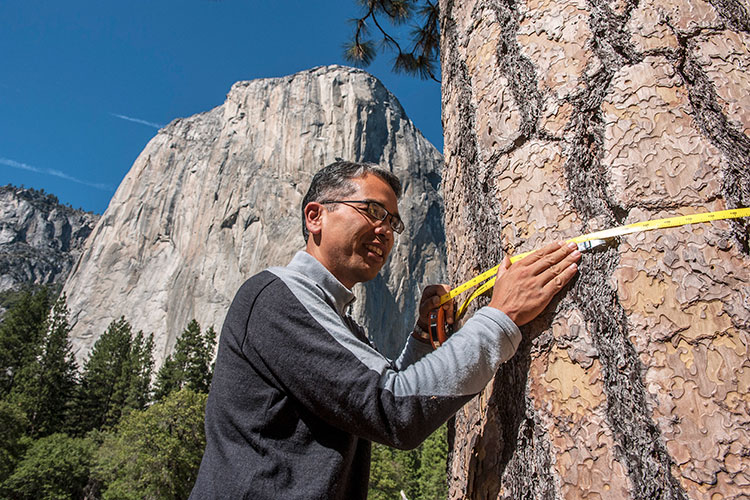UC Berkeley scientist Patrick Gonzalez to advise White House on climate change and biodiversity

The White House Office of Science and Technology Policy (OSTP) has appointed University of California, Berkeley, scientist Patrick Gonzalez as assistant director for climate and biodiversity. The OSTP advises the president, vice president and the executive office on the science needed to develop and implement national policies.
In the role, which officially begins today (Monday, Aug. 30), Gonzalez will assess the latest research for U.S. climate change and biodiversity conservation policies, including the 2050 net-zero emissions goal and the “30 by 30” conservation goal established by President Biden.
“I am honored and welcome this opportunity to advance science-based action on human-caused climate change to protect nature and people,” Gonzalez said.
An associate adjunct professor in the Department of Environmental Science, Policy, and Management (ESPM), Gonzalez served as the principal climate change scientist of the U.S. National Park Service (NPS), a position created as part of the Obama administration’s climate change strategy. He is also a faculty affiliate at both the UC Berkeley Institute for Parks, People, and Biodiversity and the Energy and Resources Group (ERG).
Gonzalez has served as a lead author on four reports of the Intergovernmental Panel on Climate Change (IPCC), the United Nations’ lead advisory body on climate change science, including a new assessment of climate change impacts to be released in 2022. The IPCC was awarded a share of the 2007 Nobel Peace Prize for climate change reports for which Gonzalez was a lead author.
“I am thrilled that Patrick will be representing UC Berkeley at OSTP in this way,” said David Ackerly, dean of Rausser College of Natural Resources. “He has long been an effective leader in the field of conservation and biodiversity, and I am confident that he will help guide ground-breaking policy with the utmost scientific rigor and aptitude.”
Patrick Gonzalez testified on February 13, 2019 to the U.S. House Natural Resources Committee on the science of human-caused climate change and impacts in national parks. His testimony provided the latest science showing that cutting carbon pollution from cars, power plants, deforestation and other human sources offers the most effective solution to protect our national parks from the most severe impacts of climate change. (House Natural Resources Committee Democrats video)
Gonzalez, who holds a doctorate from ERG, credits John P. Holdren, ERG founder and Gonzalez’s dissertation chair, as a role model for connecting science to policy. Holdren is known for serving as the science adviser to former President Obama.
“John emphasized to us that scientists can move beyond their research area and produce greater change through policy, which can help people across the country and around the world,” Gonzalez said.
As a forest ecologist, Gonzalez has conducted field research across Africa, Latin America and the United States and published in Science and other journals. Focusing on science-based action to address human-caused climate change, he analyzes the dynamics of ecosystems, wildfire and carbon solutions with the goal of informing policymakers, conserving biodiversity and protecting human well-being. He has assisted field managers and local people in 25 countries and 269 U.S. national parks.
Gonzalez served in the Peace Corps in Senegal, West Africa, where he became fluent in the local language Wolof. He later returned as a Fulbright Scholar, completing his dissertation research by hiking 1,900 kilometers to count trees and interview elders in rural villages. His research revealed that climate change killed 20% of the trees there, and that a traditional practice of natural regeneration could restore trees, on which local people in that region depend.
“Patrick is an extraordinary scientist with extensive knowledge of and experience with the impacts of climate change to our parks and public lands and who will bring high integrity to his new role with the Biden administration,” said Jon Jarvis, former director of both the National Park Service and the UC Berkeley Institute for Parks, People, and Biodiversity. “He stood up against efforts by the past administration to edit his scientific writings and restrict his ability to speak to the public and Congress about the impacts of climate change to our national parks. It now speaks highly of the Biden team that they have invited him to help lead their climate change program.”
In August, Gonzalez gave the scientific plenary at the Ecological Society of America’s annual conference. His conclusion indicated the potential importance of this new appointment at OSTP.
“Contributing science for solutions to global problems is one of the most important contributions that we can make as scientists,” Gonzalez said.
